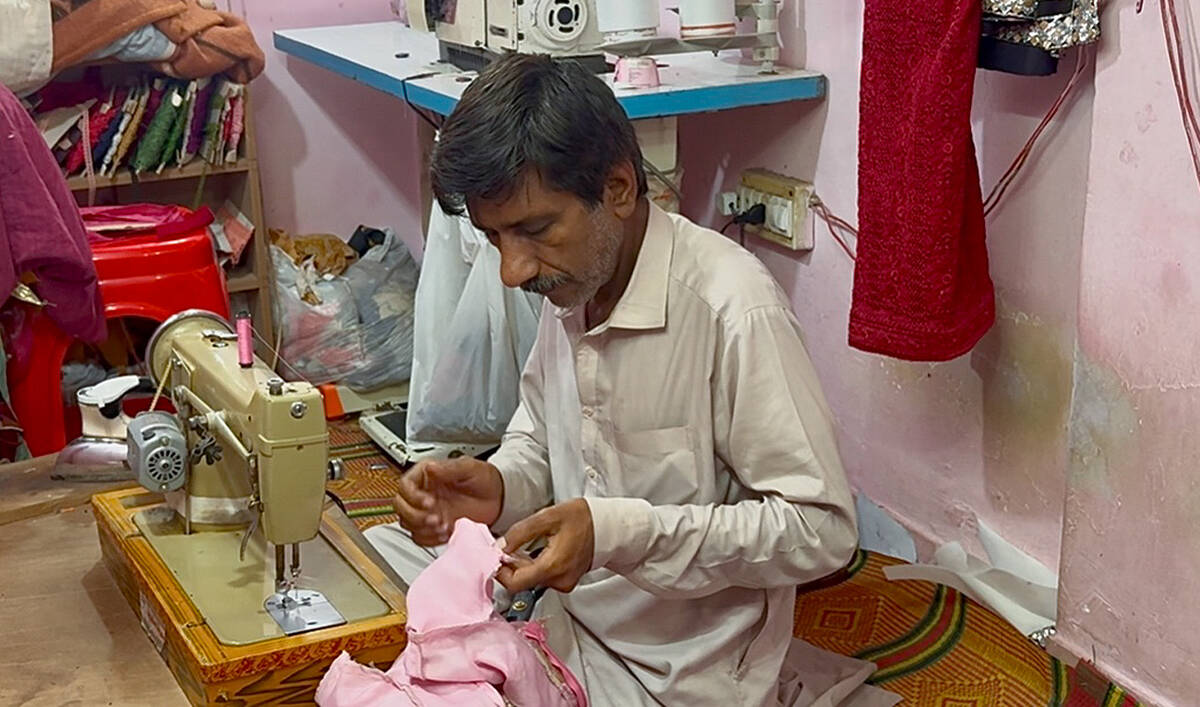ISLAMABAD: With a measuring tape draped around his neck, Muhammad Shafiq cut through a piece of fabric, expertly following along yellow chalk markings he had made according to the exact size of a client.
Each year, the demand for custom-made clothing skyrockets ahead of the Muslim festivals of Eid Al-Fitr and Eid Al-Adha, with tailoring shops in Islamabad and other cities of Pakistan bustling with women eager to get their dresses made in time. The exercise requires long shopping trips to malls and bazaars to buy cloth in various fabrics and prints, or ordering them online, and then giving them to tailors to fashion into outfits as per customized measurements and styles.
But in the past few years, many tailoring businesses have had to contend with a growing preference for ready-to-wear fashion, chosen for its convenience, affordability, and accessibility, allowing women and men alike to easily find stylish and fashionable garments without the need for custom tailoring or extensive shopping trips.
“It’s not that there is no work at all but earlier we would have advanced bookings almost a month before Eid,” Shafiq, 53, who has been a tailor for four decades, told Arab News at his cramped shop in the Pakistani capital earlier this month.

A worker at Muhammad Shafique's tailoring shop stitches clothes in Islamabad, Pakistan, on March 2025, 2025. (AN Photo)
“But now it’s down to around 10 days [of advanced bookings]. Many people don’t have the time to get clothes stitched and opt for boutique-made, ready-to-wear outfits.”
“CONVENIENCE”
Ready-to-wear clothing is widely available at Pakistani stores, department stores, and online platforms, making it easier to find and purchase. Pret collections also often reflect current fashion trends, allowing consumers to stay up to date with the latest styles. And instead of scheduling fittings and waiting for custom-made garments, consumers can simply try on and purchase ready-to-wear pieces on the go.
Arslan Haider, a designer and store manager, said boutiques and designer brands were certainly reshaping fashion preferences on holidays like Eid.
“During events like Eid, the market sees a surge in business and new fashion trends emerge in stores, which helps businesses flourish,” Haider told Arab News.

A customer sifts through stitched clothes on display at a retail clothing shop in Islamabad on March 25.2025. (AN Photo)
But tailoring still worked as a cheaper option in some cases, he said, and the older generation, more concerned with perfect fittings, preferred bespoke clothing while younger people were more inclined toward pret.
“Stitched clothes come with stylish designs and they eliminate the need for multiple visits to tailors to provide measurements and other accessories,” Haider said, adding that the convenience was a serious consideration for many customers.
“Unstitched clothes require at least seven to eight days with a tailor, and there’s always a risk of error. With stitched clothing, customers get a standardized product, whether they buy online or from a store,” he said.
Farida Qureshi, a UK-based customer visiting Pakistan for Eid, said she preferred ready-to-wear fashion as it saved time and effort. Getting an outfit stitched, on the other hand, did not just require buying the cloth and paying a visit to the tailor, but also purchasing matching accessories such as laces, beads and buttons, which was a time-consuming task.
“Finding everything in one place, ready-made is far easier than visiting different shops and then waiting for a tailor,” Qureshi said.
But there are still those who want the personalized touch of a tailor on their Eid dresses.
“I do buy ready-made clothes, but I often face size issues,” Qureshi said. “With my tailor, I get exactly what I want.”
Which is why business still thrives for many tailors like Shafiq, who work up to 16 hours daily during Ramadan to complete Eid orders.
“Some people want a perfect fit, something that ready-made clothes can’t always provide,” he said.
“I have customers who have been coming to me for years because they know I already have their measurements and can tailor their Eid clothes exactly to their liking.”






















